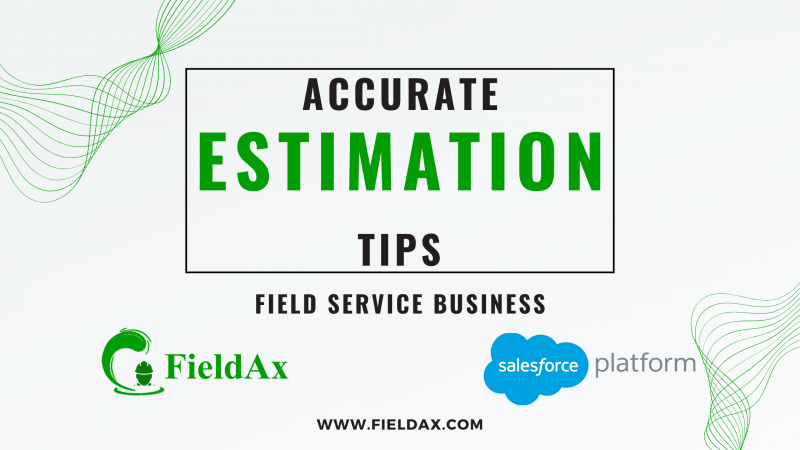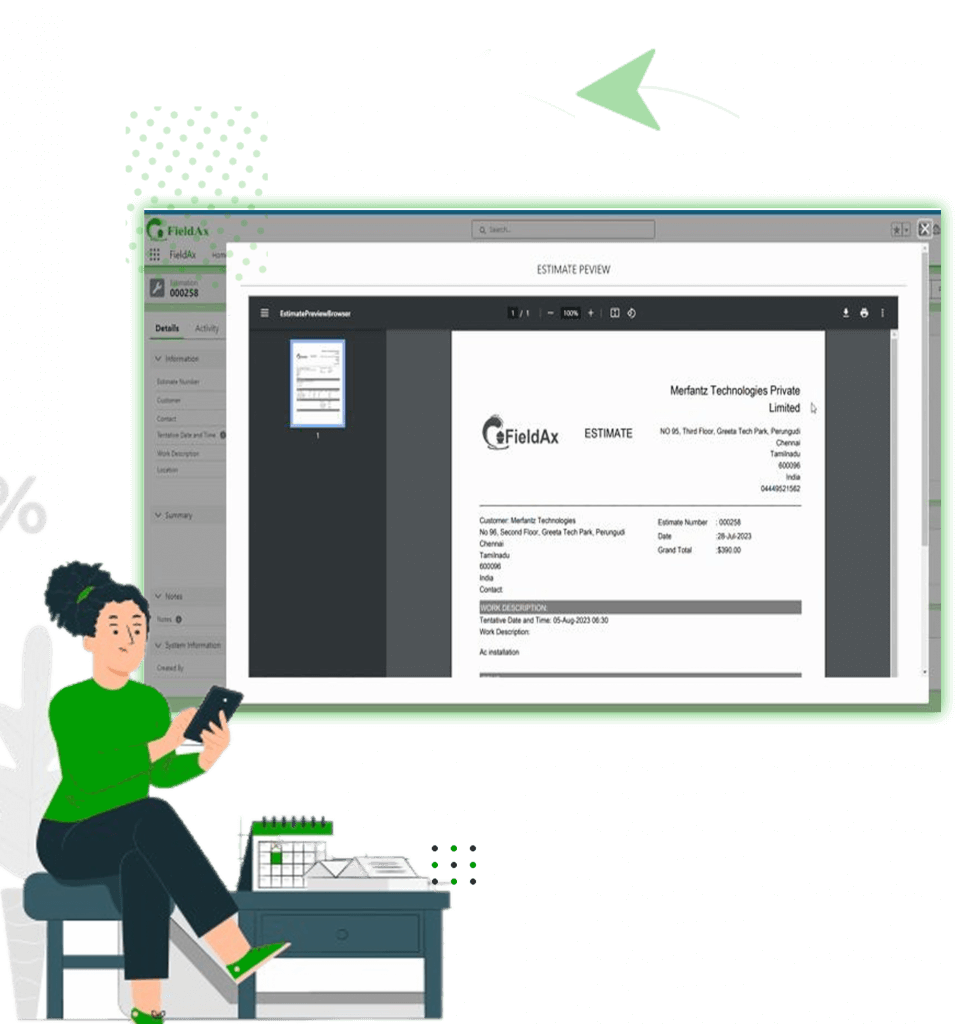In the competitive field service industry, accurate estimating plays a pivotal role in determining the success or failure of a business. Whether you provide plumbing, electrical, or HVAC services, mastering the art of estimating is essential to ensure profitability and customer satisfaction. However, many field service businesses struggle with this aspect, often resulting in costly mistakes and dissatisfied customers.

The Importance of Accurate Estimating in Field Service Businesses
Accurate estimating is crucial for field service businesses for several reasons. Firstly, it helps establish trust and credibility with clients. When you provide precise estimates, clients are more likely to trust your expertise and rely on your services. This, in turn, leads to increased customer satisfaction and loyalty.
Secondly, accurate estimating ensures profitability for your business. When you accurately estimate the cost of a project, you can set appropriate pricing that covers your expenses and allows for a reasonable profit margin. On the other hand, if your estimates are consistently inaccurate, you may end up undercharging for your services, leading to financial losses.
Lastly, accurate estimating allows for efficient resource allocation. By accurately estimating the time and materials required for a project, you can effectively schedule your workforce and allocate resources. This prevents delays, reduces wastage, and optimizes productivity, ultimately benefiting both your business and your clients.
Common Challenges in Estimating for Field Service Businesses
Estimating accurately in the field service industry is not without its challenges. One common challenge is the variability in project requirements. Each project is unique, and there may be unforeseen complexities and scope changes that affect the estimate. Additionally, field service businesses often face time constraints and tight deadlines, making it challenging to account for every detail accurately.
Another challenge is the lack of comprehensive data. Estimating requires access to historical data, such as material costs, labor rates, and productivity metrics. However, many field service businesses do not have a robust data management system in place, making it difficult to gather and analyze the necessary information for accurate estimating.
Lastly, estimating for field service businesses requires a deep understanding of the industry and the specific services provided. It requires knowledge of the labor required, material costs, and potential challenges that may arise during the project. Without this expertise, estimators may struggle to provide accurate estimates.
Tips for Improving Accuracy in Estimating
While accurate estimating may seem daunting, there are several strategies that field service businesses can implement to improve accuracy. These tips can help you refine your estimating process and deliver precise estimates that align with client expectations and budget.
1. Understand the Scope of Work
Before providing an estimate, it is essential to thoroughly understand the scope of work. This includes identifying the specific tasks involved, the materials required, and any potential challenges that may arise. By gaining a comprehensive understanding of the project, you can create a more accurate estimate that accounts for all the necessary components.
To understand the scope of work, communication is key. Collaborate closely with the client and project stakeholders to gather all the relevant information. Ask detailed questions to clarify any uncertainties and ensure that everyone is on the same page regarding project requirements. This will help you avoid misunderstandings and provide a more accurate estimate.
2. Factor in Unexpected Challenges
In the field service industry, unexpected challenges are inevitable. Whether it’s encountering unforeseen issues during installation or facing delays due to external factors, it’s crucial to factor in these potential challenges when estimating. By incorporating contingency plans and buffers into your estimates, you can account for these uncertainties and avoid underestimating the time and resources required for a project.
One way to mitigate the impact of unexpected challenges is to conduct thorough site assessments before providing an estimate. This allows you to identify potential obstacles or complications that may arise during the project. By incorporating these potential challenges into your estimate, you can provide a more accurate quote that reflects the reality of the project.
3. Utilizing Technology for More Precise Estimating
In today’s digital age, technology plays a significant role in improving accuracy and efficiency in estimating. Field service businesses can leverage various software and tools to streamline their estimating process and minimize human error.
One such technology is FieldAx software. FieldAx software allows you to utilize Estimate features to determine how many technicians will be required and the parts that will be used, providing comprehensive insights into the project. By leveraging FieldAx software, you can eliminate guesswork and ensure precise measurements, significantly enhancing the accuracy of your estimates.
Additionally, there are estimating software solutions specifically designed for field service businesses. These tools often include pre-built databases of material costs, labor rates, and productivity metrics, making it easier to generate accurate estimates. Some software even allows you to create customizable templates for different types of projects, saving time and ensuring consistency in your estimates.
4. The Role of Data Analysis in Accurate Estimating
Data analysis is a valuable tool for field service businesses to improve the accuracy of their estimates. By analyzing historical data, businesses can identify trends, patterns, and deviations that can inform future estimates.
One aspect of data analysis is examining historical project data. By reviewing past projects, you can identify common challenges, productivity rates, and material usage patterns. This information can help you make more informed decisions when estimating similar projects in the future.
Another aspect of data analysis is tracking and analyzing financial data. By monitoring your expenses, labor costs, and material costs, you can identify areas where your estimates may have deviated from the actual costs. This allows you to make adjustments and refine your estimating process to improve accuracy.
Best Practices for Creating Detailed and Comprehensive Estimates
Creating detailed and comprehensive estimates is essential to accurately convey the scope of work and associated costs to the client. Here are some best practices to help you create estimates that are both informative and precise.
1. Break Down the Estimate into Components
When creating an estimate, it’s helpful to break it down into different components. This allows the client to understand the individual elements that make up the total cost. For example, you could break down the estimate into labor costs, material costs, permits, and any additional fees. By providing a transparent breakdown, you demonstrate your attention to detail and build trust with the client.
2. Include Clear Assumptions and Exclusions
To avoid misunderstandings and disputes later on, it’s crucial to clearly state any assumptions or exclusions in your estimate. Assumptions are the underlying conditions or factors that you have considered when providing the estimate. Exclusions, on the other hand, are items or services that are not included in the estimate. By explicitly stating these assumptions and exclusions, you manage the client’s expectations and minimize the risk of disputes.
3. Provide Detailed Descriptions of Work
To ensure clarity, provide detailed descriptions of the work involved in your estimate. Break down the project into specific tasks and outline the materials and labor required for each task. This level of detail helps the client understand the scope of work and allows for more accurate communication and decision-making.
4. Consider Pricing Factors
When creating estimates, it’s important to consider various pricing factors that may influence the final cost. These factors can include the current market rates for labor and materials, any applicable taxes or fees, and any discounts or promotions that may apply. By considering these pricing factors, you can provide a more accurate estimate that reflects the current economic conditions and the specific circumstances of the project.
Training and Development for Estimators in Field Service Businesses
Estimators play a critical role in accurate estimating for field service businesses. Investing in their training and development can significantly improve the accuracy and efficiency of your estimating process. Here are some training strategies to consider:
1. Technical Training
Provide technical training to estimators to enhance their knowledge and understanding of the industry. This can include training on the latest technologies, materials, and techniques relevant to your field. By staying up-to-date with industry advancements, estimators can provide more accurate estimates that reflect current best practices.
2. Communication and Negotiation Skills
Estimators interact with clients, project stakeholders, and suppliers on a regular basis. Therefore, it’s important to invest in their communication and negotiation skills. Effective communication ensures that estimators gather all the necessary information to create accurate estimates, while negotiation skills help them navigate pricing discussions and secure favorable terms with suppliers.
3. Continued Professional Development
Encourage estimators to pursue continued professional development opportunities. This can include attending industry conferences, participating in workshops or webinars, and obtaining relevant certifications. Continued learning not only keeps estimators updated with the latest industry trends but also demonstrates your commitment to their professional growth.

Software for Streamlining the Estimating Process
Utilizing software can significantly streamline the estimating process for field service businesses. Here are software solution to consider:
Investing in FieldAx software streamlines your field service business operations by offering a comprehensive suite of features designed to optimize every aspect of your workflow. With FieldAx, you can handle all tasks from estimation to invoice generation, parts calculation, inventory management, technician time card tracking, and parts management within a single, integrated solution. FieldAx’s robust estimating tools come equipped with comprehensive databases of labor rates, material costs, and productivity metrics, allowing you to create customizable templates for various project types. This not only ensures consistency in your estimates but also saves valuable time, enabling you to focus more on delivering exceptional service to your customers.
Furthermore, FieldAx incorporates sophisticated data analytics tools that analyze historical project data and financial metrics. These tools enable you to identify trends, patterns, and deviations, empowering you to make more informed decisions and continuously improve the accuracy of your estimates. By leveraging data insights, you can refine your estimating processes, optimize resource allocation, and enhance overall business performance. Investing in FieldAx not only streamlines your workflow but also positions your field service business for long-term success in a competitive market landscape.
See how FieldAx can transform your Field Operations.
Try it today! Book Demo
You are one click away from your customized FieldAx Demo!
FAQs (Frequently Asked Questions)
1. Why is accurate estimating crucial for field service businesses?
Accurate estimating is vital for field service businesses as it establishes trust and credibility with clients, ensures profitability, and facilitates efficient resource allocation. Precise estimates lead to increased customer satisfaction, loyalty, and ultimately, business success.
2. What are some common challenges in estimating for field service businesses?
Field service businesses often encounter challenges such as variability in project requirements, time constraints, and a lack of comprehensive data. Estimators may struggle to gather accurate information or anticipate unforeseen complications, leading to inaccuracies in estimates.
3. How can field service businesses improve accuracy in estimating?
Field service businesses can improve accuracy in estimating by understanding the scope of work thoroughly, factoring in unexpected challenges, utilizing technology for precise estimating, and leveraging data analysis to inform future estimates. Training and development for estimators are also essential for enhancing accuracy.
4. What role does technology play in streamlining the estimating process?
Technology, such as FieldAx software, streamlines the estimating process by offering features for estimating, invoice generation, parts calculation, inventory management, technician time card tracking, and parts management within a single, integrated solution. It eliminates guesswork, ensures precise measurements, and empowers businesses to optimize every aspect of their workflow.
5. How does accurate estimating impact the success of field service businesses?
Accurate estimating positively impacts the success of field service businesses by enhancing their reputation as reliable service providers, attracting more clients, and driving profitability. It enables businesses to deliver precise estimates that align with client expectations and budget, ultimately fostering long-term success in a competitive market landscape.
Conclusion: The Impact of Accurate Estimating on the Success of Field Service Businesses
Accurate estimating is a crucial aspect of running a successful field service business. It establishes trust with clients, ensures profitability, and optimizes resource allocation. By implementing the tips and strategies outlined in this article, you can enhance the accuracy of your estimates and set your business up for success.
Remember to thoroughly understand the scope of work, factor in unexpected challenges, utilize technology and data analysis, and create detailed and comprehensive estimates. Additionally, invest in the training and development of your estimators and leverage tools and software to streamline the estimating process.
Mastering the art of accurate estimating takes time and effort, but the rewards are well worth it. By consistently providing precise estimates, you can enhance your reputation as a reliable and trustworthy service provider, attract more clients, and ultimately drive the success of your field service business. So, embrace these essential tips and unlock the potential of your business today!
Author Bio
Co-Founder & CMO at Merfantz Technologies Pvt Ltd | Marketing Manager for FieldAx Field Service Software | Salesforce All-Star Ranger and Community Contributor | Salesforce Content Creation for Knowledge Sharing






